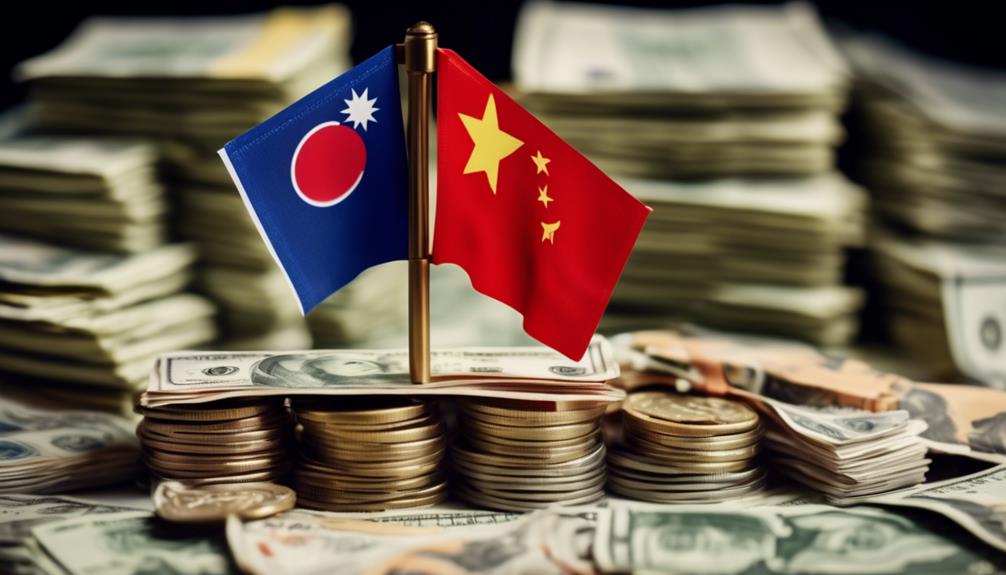Have you ever heard the saying, 'When elephants fight, it is the grass that suffers'? Well, in the case of the escalating tensions between Taiwan and China, the world is starting to feel the tremors.
The potential conflict not only poses a direct confrontation between two global superpowers but also threatens to disrupt the global economy. With industries heavily reliant on Taiwanese semiconductors at stake, the consequences could be far-reaching.
Recent developments have only added fuel to the fire, leaving many to wonder if Taiwan is becoming a geopolitical flashpoint.
So, what exactly are the implications of this conflict for the global economy? Stay tuned to find out.
Key Takeaways
- Tensions and differing views on sovereignty between China and Taiwan have led to increased tensions.
- The potential consequences for the global economy include disruption of supply chains, market instability, decreased consumer confidence, and geopolitical ramifications.
- Recent developments, such as the election in Taiwan, have raised concerns about China's intentions and created a sense of unease and uncertainty.
- The conflict between Taiwan and China could become a geopolitical flashpoint with implications for regional stability and the global economy, emphasizing the need for careful and diplomatic management.
Background: Tensions and Views
Tensions between Taiwan and China have been escalating due to their differing views on sovereignty and reunification. China considers Taiwan as part of its territory and Chinese Premier Xi Jinping is determined to reunite the two countries. On the other hand, Taiwan asserts its independence and is backed by the United States.
This disagreement over Taiwan's status has led to increased tensions and potential conflicts between the two nations. The Chinese premier's intentions to reunify Taiwan have raised concerns in Taiwan about their neighbor's actions and intentions. The Taiwanese government and people are wary of China's growing influence and assertiveness in the region.
These differing views and concerns have contributed to the ongoing tensions in Taiwan-China relations.
Potential Consequences for Global Economy
The potential conflict between Taiwan and China poses a significant threat to the global economy, with dire implications for various industries and the interconnectedness of the world's markets. The impact on supply chains would be severe, disrupting the flow of goods and services and causing widespread economic disruptions. Geopolitical ramifications would be felt globally, as other countries navigate the delicate balance between supporting Taiwan's independence and maintaining relations with China.
- Disruption of supply chains: The conflict could lead to disruptions in the global supply chains, affecting industries such as electronics, automotive, and manufacturing. This would result in delays in production, shortages of products, and increased costs.
- Market instability: The uncertainty surrounding a Taiwan-China conflict would likely cause market volatility, with stock prices fluctuating and investors becoming cautious. This could lead to a slowdown in investment and economic growth.
- Decreased consumer confidence: The potential conflict could lead to decreased consumer confidence, as people become uncertain about the future. This would result in reduced spending, impacting various sectors of the global economy.
These potential consequences highlight the interconnectedness of the global economy and the need for diplomatic solutions to avoid catastrophic disruptions.
Recent Developments and Taiwanese Perspective

Amidst the potential consequences for the global economy, recent developments and the Taiwanese perspective shed light on the growing concerns and tensions surrounding the Taiwan-China conflict.
The recent election in Taiwan has brought the issue to the forefront. Beijing's reaction to the election result has raised concerns over China's intentions. Taiwanese citizens are worried about the increasing assertiveness of China and its desire to reunite with Taiwan. There's a sense of unease and uncertainty about the future relationship between the two countries. The Taiwanese sentiment towards their neighbor is one of caution and vigilance.
There's a real possibility that Taiwan could become a geopolitical flashpoint, with significant implications for regional stability and the global economy. These recent developments highlight the need for a careful and diplomatic approach in managing the Taiwan-China conflict.
Macro Factors Driving the Crypto Market
Understanding the driving forces behind the crypto market requires a careful analysis of macro factors such as the influence of Fed chairman Jerome Powell and Treasury Secretary Janet Yellen, as well as the impact of the US government's funding plans and debt issuance. These factors play a crucial role in shaping the market dynamics and investor sentiment.
Here are some key points to consider:
- Impact of regulatory measures: Regulatory actions by governments worldwide can significantly impact the crypto market. Increased regulations can lead to heightened scrutiny, affecting investor confidence and market stability.
- Influence of institutional investors: The participation of institutional investors, such as hedge funds and asset managers, has a significant influence on the crypto market. Their buying and selling decisions can cause price fluctuations and drive market trends.
- Market response to government funding plans and debt issuance: The crypto market is sensitive to government funding plans and debt issuance. Investors closely monitor these factors as they can impact inflation, interest rates, and overall market liquidity.
Impact of Tax Season on Interest Rates and Debt Issuance

During tax season, the impact on interest rates and debt issuance becomes a significant concern for market participants and investors. Tax season effects can have implications for government debt supply and interest rates.
As taxpayers make their payments, the need for government debt issuance may decrease. This reduced supply of debt can potentially lead to a decrease in yields, as there's less demand for government bonds.
Additionally, the Treasury may implement a buyback strategy, where it purchases certain durations of its debt from the market. This strategy can further reduce the supply of government debt and potentially impact interest rates.
Conclusion: Implications for Global Economy
The Taiwan-China conflict poses a significant threat to the global economy, with potential consequences ranging from direct confrontation between superpowers to the crippling of various industries heavily reliant on semiconductors.
The global economic impact of this conflict can't be understated. The semiconductor industry, which plays a critical role in the production of smartphones, cars, computers, and other devices, would be severely affected. This would lead to supply chain disruptions and skyrocketing prices for consumers.
The implications for the global economy are troubling, as it could result in a domino effect, affecting other industries and causing a downturn in global trade. The heavy dependence on semiconductors highlights the vulnerability of the global economy to this conflict.
It's imperative for global leaders to work towards a peaceful resolution to mitigate these potential repercussions.
Frequently Asked Questions
How Does Taiwan's Assertion of Independence Impact Its Relationship With China?
Taiwan's assertion of independence strains its relationship with China. The United States involvement intensifies tensions. Potential consequences for industries include disruptions in supply chains, particularly in electronics and technology sectors.
What Role Does the United States Play in Supporting Taiwan?
The United States plays a crucial role in supporting Taiwan through diplomatic relations. It provides military assistance and defends Taiwan's sovereignty, which contributes to stability in the region.
How Would a Conflict Between Taiwan and China Affect the Global Economy?
A conflict between Taiwan and China could have significant impacts on the global economy. It could disrupt global supply chains and have implications for regional security, leading to potential economic consequences worldwide.
What Are the Potential Consequences for Industries Heavily Reliant on Semiconductors?
Industries heavily reliant on semiconductors could face potential consequences if a conflict between Taiwan and China escalates. The global economy would be adversely affected, impacting sectors such as smartphones, cars, computers, and other devices.
What Are the Recent Developments in Taiwan and How Do They Relate to the Conflict With China?
Recent developments in Taiwan, such as the recent election and Beijing's reaction, have heightened concerns about China's intentions. Taiwan's assertion of independence further strains its relationship with China, increasing the likelihood of a geopolitical flashpoint.
Conclusion
So, there you have it – the escalating tensions between Taiwan and China have the potential to cripple the global economy.
It's almost ironic how the very devices we rely on so heavily, like smartphones and computers, could be the ones to suffer the most.
As the world watches anxiously, hoping for a peaceful resolution, the question remains: will Taiwan become the unexpected trigger for a geopolitical catastrophe?
Only time will tell.







